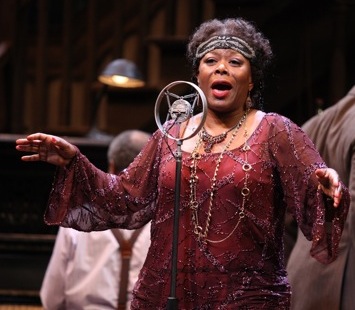Ma Rainey's Black Bottom transports audiences to 1920s Chicago specifically, to a shabby recording studio where renowned blues singer Ma Rainey is supposed to cut a record. August Wilson's play is based on the real-life Gertrude "Ma" Rainey, a Bessie-Smith style singer with a large black following.
The first characters one meets are two white males. One of them, the record producer, complains about Ma's "difficult" behavior. The other one, Ma's agent, reminds the producer of all the money he makes off Ma's records. Then the band members start arriving. Each fellow is as distinct as the instrument he plays. The band members file into a room in the recording studio's basement. They start to warm up and rehearse before the session begins.
Wilson's words are mesmerizing from this point forward. Each conversation is beautifully scripted such as the seemingly random thoughts tossed out by the band members. After all, they are just killing time before the session begins.
The play is much more than a rant about injustices done to black artists in the early days of the recording industry. August Wilson weaves together themes of black culture, black history, racial prejudice and spirituality. Toledo, the philosopher, tries to "educate" his fellow band members. Slow Drag, another of the band's senior members, tolerates Toledo's arguments but doesn't quite believe him.
The band's youngest member, a 32-year-old trumpet player, isn't interested in Toledo's point of view. He wants to "shake things up." He realizes that Ma's musical style is fading in popularity, and he wants to introduce jazz elements into her songs. This wins approval from the white producer but not from Ma herself. The battle lines are drawn. And make no mistake, says Cutler, the band's leader. "What Ma says, goes." Levee, the horn player, mainly dreams of having his own band and suggests that the white producer may sign him to a record deal.
By the time the formidable "Ma" makes her entrance, the conflicts are all neatly set up: whether Ma will acquiesce to Levee's arrangement of her famous song, "The Black Bottom"; whether the band will survive yet another of Ma's infamously long and contentious recording sessions; and whether Ma's frazzled agent can successfully meet her endless list of demands. Ma never wavers. As she reminds the producer, "I make more money for you than all your other artists put together."
Numerous interruptions delay the recording session, giving Wilson further room to develop his characters. "Ma" resplendent in a shimmering red dress plays her diva role to the hilt. The The hot-headed Levee tests Ma's endurance with his trumpet riffs and also for making eyes at the sexy young girl who is part of Ma's entourage. Later, Levee also learns that white folks don't always live up to their promises. With his dream shattered and his hopes of attracting the young girl slipping away, Levee is a time bomb about to explode. Wilson delivers an ending that is shocking and appropriate at the same time.
Although he had many more plays to write in his brief lifetime, August Wilson reached a level of excellence in Ma Rainey's Black Bottom that may have been equaled but not surpassed. His characters are sharply drawn and vividly brought to life by this production's excellent cast.
This show is the first joint effort between the Milwaukee Rep and the Actors Theatre of Louisville. The play came to Milwaukee after its Louisville. It was worth the wait.
The two companies have assembled a near-perfect cast. Most of the actors have had experience with August Wilson's plays in the past, and it shows. As Ma Rainey, Greta Oglesby struts about the stage like the diva she is. She provides a great deal of the humor that punctuates Wilson's script. When Ma launches into her signature song, the "Black Bottom," Oglesby makes an almost visible transformation as she becomes one with the music. Even in the upbeat numbers, Oglesby's voice is tinged with a hint of the blues.
The four actors who play members of Ma's band are top-notch, as well. Cutler, the aging band leader, is played by Ernest Perry, Jr. Slow Drag is A.C. Smith and Toledo is Alfred H. Wilson. They all exude the appropriate air of resignation. Anthony Fleming II gives a memorable turn as the brash, headstrong Levee. As Dussie Mae, Erynn Mackenzie uses every trick in the book to draws all eyes on her. She is a sassy, streetwise and lovely girl, her beauty heighted by a figure-revealing yellow dress.
Also on the younger end of the cast, Jonathan Butler-Duplessis impresses as a young boy who despite a terrible stammer struggles to meet the expectations of Ma, his aunt. The dialogue between them reveals Ma's softer side. Overall,
Wilson's unique blend of humor and unhappiness makes Ma Rainey's Black Bottom the best production of the Rep's current season (which is saying a lot). The show's gorgeous, three-tiered set and spectacular, authentic-looking costumes further reinforce the atmosphere of 1920s Chicago.

